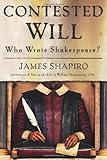 James Shapiro’s latest book Contested Will: Who Wrote Shakespeare? examines the Shakespeare authorship question in a way that it traditionally hasn’t been examined by academics: seriously. An interesting problem has arisen in the age of the Internet: the conspiracy theorists have been able to be heard in ways that were impossible 20 or 30 years ago, and their claims have been taken much more seriously as a result. We live in an era that thrives on conspiracy and hidden history. Shapiro, rightfully I think, recognized that it was time for a serious Shakespeare scholar to examine and present the case for Shakespeare as the writer of his plays—which he has managed to do brilliantly and without resorting to attacking the intellect of the anti-Stratfordians.
James Shapiro’s latest book Contested Will: Who Wrote Shakespeare? examines the Shakespeare authorship question in a way that it traditionally hasn’t been examined by academics: seriously. An interesting problem has arisen in the age of the Internet: the conspiracy theorists have been able to be heard in ways that were impossible 20 or 30 years ago, and their claims have been taken much more seriously as a result. We live in an era that thrives on conspiracy and hidden history. Shapiro, rightfully I think, recognized that it was time for a serious Shakespeare scholar to examine and present the case for Shakespeare as the writer of his plays—which he has managed to do brilliantly and without resorting to attacking the intellect of the anti-Stratfordians.
Shapiro begins by examining the origin of the anti-Stratfordian movements in an unlikely place—the early biographies of Shakespeare, which sought to correlate Shakespeare’s life to his plays and sonnets. It’s a slippery slope, Shapiro warns, because it ultimately deprives Shakespeare of an imagination. Shapiro also examines the rise and fall of the Baconians. The history of the Oxfordian movement was particularly interesting in light of the fact that many famous actors and even Supreme Court justices have decided in favor of Oxford over Shakespeare. And Shapiro does not flinch from describing the uncanny resemblances some parts of Oxford’s life have to the plays; however, he also presents solid evidence in favor of Shakespeare that should put to rest any doubts. It should, but it won’t precisely because people seem compelled to believe in their favorite candidates with the zeal almost of adherents to a religion. Terms like “heretic” and even “blasphemy” are thrown around. And in such a tightly contested matter, even if the preponderance of the historical evidence is in favor of Shakespeare, minds are not going to be changed. However, what Shapiro’s book likely will do is offer those skeptical but not entrenched a solid argument for Shakespeare. This book is a must read for Shakespeare lovers and teachers of Shakespeare. Every year my students ask me about authorship. I feel much more informed now than I have felt in the past.
Rating: 




I don’t know that I can attain Litlover status in the Bibliophilic Books Challenge, but this book would make a fourth book toward the six required to meet that challenge level. I committed to reading three: the Bookworm level.
As a postscript, I enjoyed reading this book on my Kindle very much. I was much more absorbed into the book than usual, interestingly enough, and I forgot these books usually have a lot of notes and a large index, so I reached the “end” well before I realized it.

I got this for my birthday, and I can't wait to read it! I would be curious to see a book where all the arguments for the authorial candidates were presented and explored, but in a way, this sort of history of the authorship controversy is even more interesting.
Shapiro mainly discusses Bacon and Oxford, though he mentions others. It seems those two had the largest following, however. The history is really interesting.
Can I just ask, does the Kindle make it easy to skip back and forth when reading endnotes? And similarly is there simple navigation when looking up items in the index?
Hmm. The answer is that I don't know. This particular book had a biographical essay at the end rather than endnotes. It would likely depend on whether the notes were hyperlinked, like the Table of Contents in some of the Kindle books. If not, then I imagine it would be frustrating to go back and forth (though the back button does a pretty good job).
After many college courses on Shakespeare I read several of the books out making an argument against Shakespeare, but none of them completely convinced me. This one looks good.